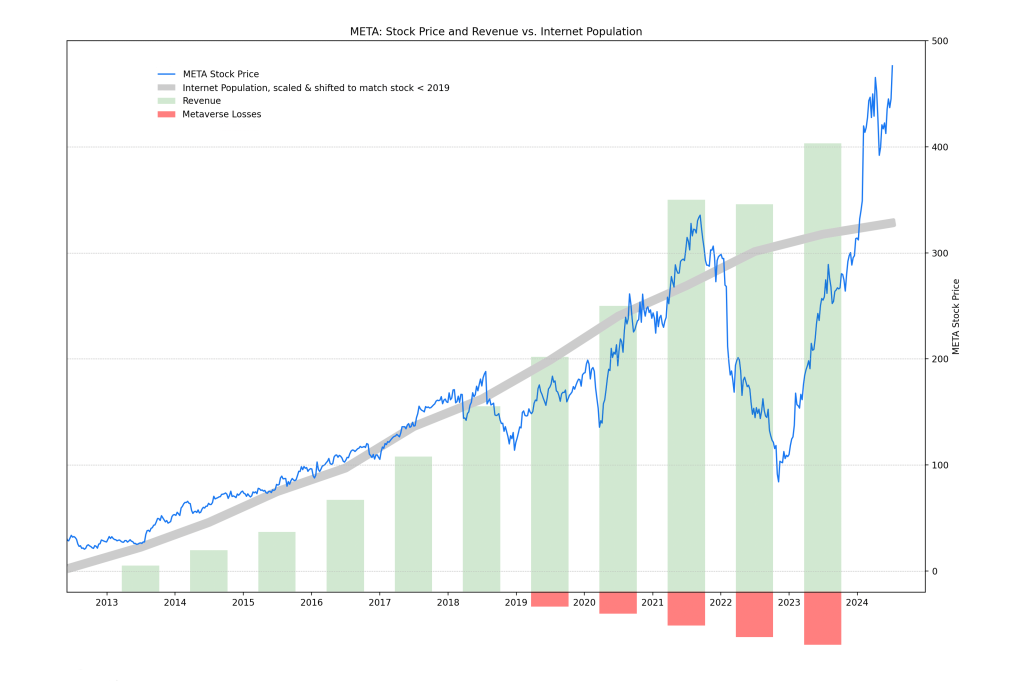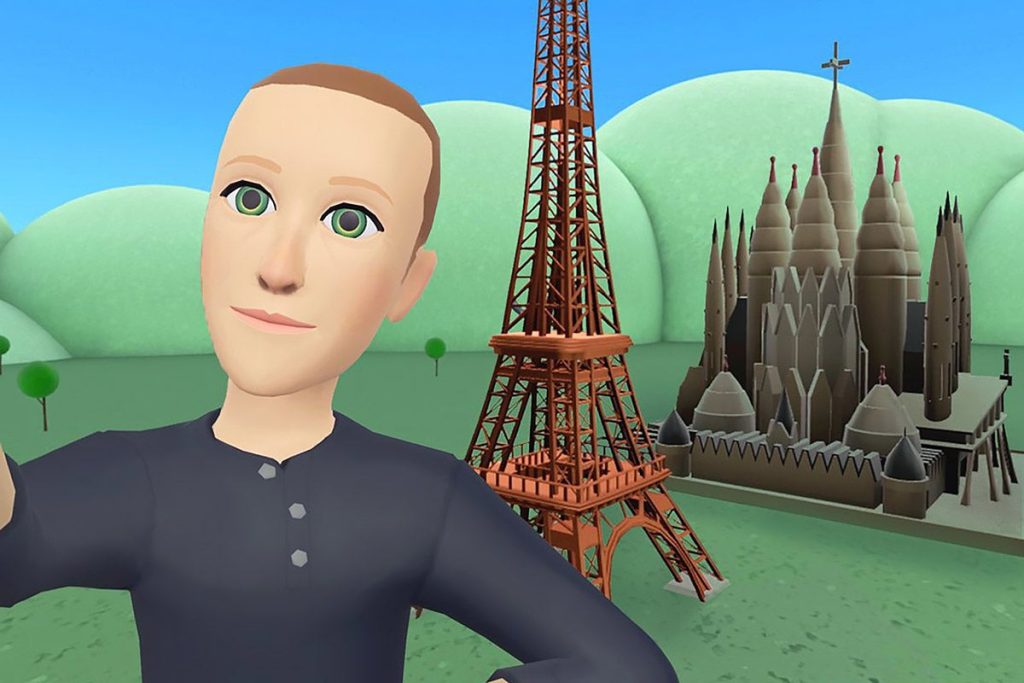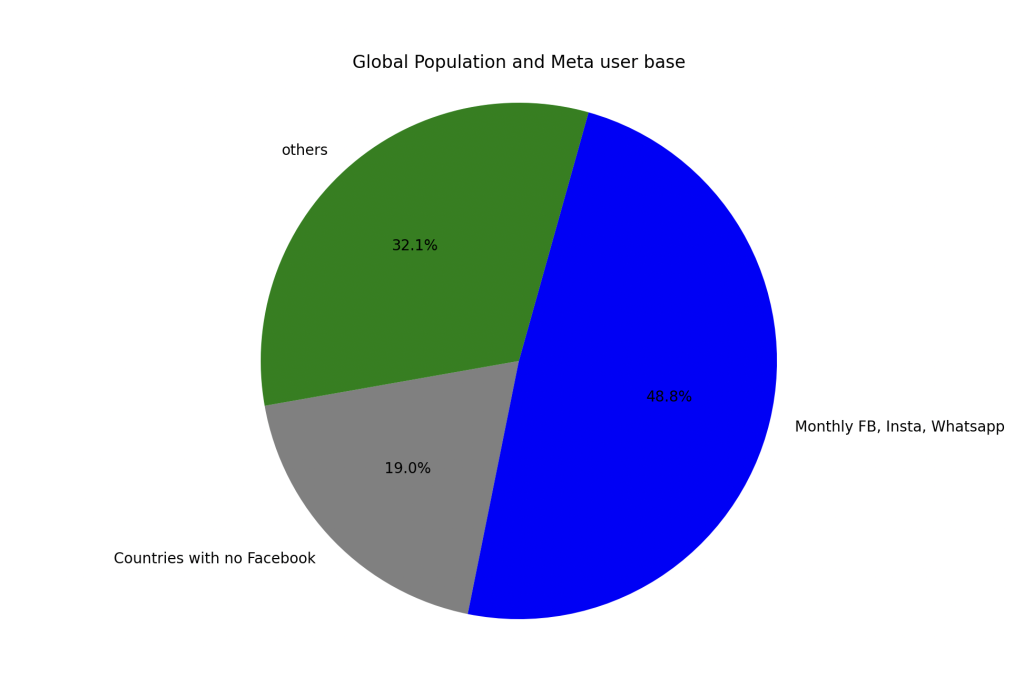What does Meta do? It turns people into money. Those that are on the Internet, that is—not in a Soylent Green kind of way.

At least, that was the mantra up until 2018. Then Cambridge Analytica broke. And the Q2 2018 earnings gave an inkling of the possibility that not a fixed—and also rather large—ratio of people entering the Internet would become, just like magic, Facebook users.
Later, people seemed to forget about the fact that they get algorithmically nudged in Zuck’s wonderland every step of the way. Wall Street itself realized that revenues at 1 Hacker Way actually kept on rising—until they jumped in 2021. COVID, remember?

The Metaverse, however, wasn’t really that great of a hit, and after the virus bonus revenue fell back in line the following year, FB lost a staggering two-thirds of its value. A trillion-dollar meme stock.
An attribute that it then turned into current heights via hitching itself to the AI bandwagon.
Releasing the LLaMA weights is undoubtedly a commendable move. It sounds utterly impressive when you can claim, “While we’re working on today’s products and models, we’re also working on the research we need to advance for LLaMA 5, 6, and 7 in the coming years and beyond to develop full general intelligence,” in an earnings call. Pretty much like that strange man proclaimed five years ago: “I want 5G, and even 6G, technology in the United States as soon as possible.” Numbers: They go up, up, and up.

Hype aside, I am not really aware of any practical applications for LLaMA 3. Zuck bought lots of GPUs. Both Jensen and I are happy about that. Maybe they thought they had all this data that people have entered in their apps. Maybe they could train a LLM on it. With GPT-3, there was this notion that the size of the training corpus was all that mattered. After all, OpenAI’s chatbot was such a wonder, and it jumped into existence just via the increase of its training data. I speculate that a trillion training tokens derived from FB discussions yield surprisingly little meaningful reasoning power. Especially compared to actual content like, for instance, Wikipedia.
The pressure to come up with something must have weighed heavily on 1 Hacker Way. As those two transformer-based applications (LLMs and Image Diffusers) broke into public view and kicked the world into a frenzy that seemingly became the new normal, Meta itself had just spent around $50 billion on developing, well, the Metaverse. Which received rather little positive reaction, to put it mildly.

The total and utter failure of Zuck’s idea to come up with a whole new thing left Meta with no choice but to jump on the AI hype PR scheme. And up to this day, it has worked rather well. While revenue is ticking along as expected, the stock is kissing new heights. For now.
So, what’s next?
Nobody knows.
What will happen is that Internet population growth will end. There are simply no more people left that could join. Pretty much everybody who could go online already has done so. While 25% of the world’s population are younger than 15, many of them live in underdeveloped parts of Africa. Furthermore, young people hardly flock eagerly into the Meta family of products once they get their first Internet device.

Meta’s revenue growth would therefore stall together with the plateau in its user count. While they continue to make a lot of money, a PE ratio of currently around 30 is expecting something else: More money. You need to grow profits to justify such a valuation.
A quick way to bump revenues would be to reduce costs. Twitter is still up and running, despite Mr. Musk letting go of most of its workforce. A tempting move that could save the numbers for a quarter or two at Menlo Park as well. The problem is that this approach works only briefly: Costs go down to zero. But not more.

Which means that Meta needs to increase revenues while user numbers can no longer grow.
Can Zuck’s companies accomplish that? They might, but it would not be pretty: Billions of people have delegated a great part of their social existence into the “Meta Family of Products”. (What’s in a name?) A sticky situation in itself. Add to that the addictive aspects that rival nicotine, and you realize that half the planet as a user base won’t go anywhere fast.
Wealth as well as the inflexibility to change app use or social topology both tend to grow with increasing age. Meta owns people’s time and attention in staggering amounts.

Here comes the part that isn’t pretty: it is rather easy to manipulate people online. Tech is able to do it. And will increasingly be. There is a threshold after which you no longer realize that you got nudged.
When the magician manages to direct your attention successfully, all sorts of things are possible. With a serious difference: Magic lives from the effect, that the outcome shows you, that you must have missed something. You are supposed to notice that it is impossible what just happened.
Manipulation to gain, aka advertisement, has a different aim: You should be made to act in certain ways, all the while thinking that you want to do that.

The total spending of Meta family users is responsible for a mind-boggling share of GDP. And, as discussed, most of the users will not go anywhere. If Meta does not f*ck up royally, pretty much half of the global adults will continue to point their noses, eyes, minds, and wallets its way.

Turning on the manipulation engine will not be one deliberate conscious act or one magnificent large piece of software. Lots of little changes will yield lots of little benefits. With billions of people, you can do a whole lot of A/B testing. Nobody will notice. Everybody’s feed is different and the fact that you see wording that is ever so slightly different will not trigger any of the societal mechanisms that will raise a reaction.

Jacob Riis used flash photography at the end of the 19th century to show the world how poor people lived in NYC, and he changed the world for the better. I cannot imagine how we can illuminate the modern plight of getting nudged into an ultimately unhappy existence that looms on the horizon.